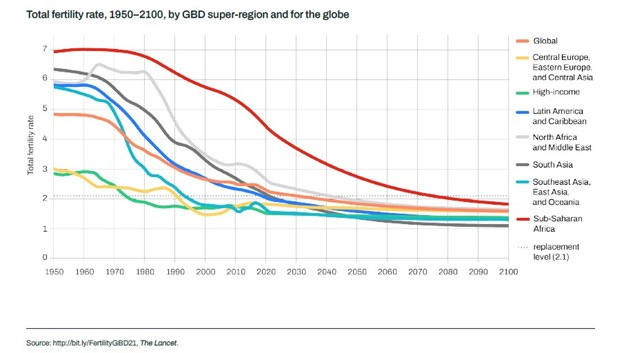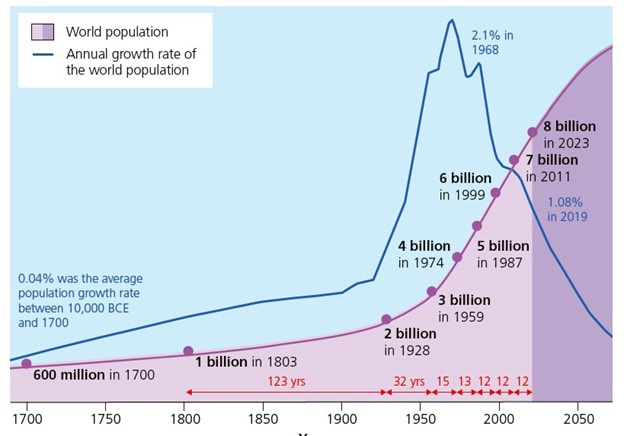[In March 2024, the medical journal The Lancet published an article on global fertility rates. This piece summarises the main points, together with some additional material.]
The main headlines:
By 2050, over 75% (155 of 204) of countries will not have high enough fertility rates (i.e. a total fertility rate (TFR) of at least 2.1) to sustain their population size.
By 2100, this will increase to 97% of countries (198 of 204). Only 6 countries (Samoa, Somalia, Tonga, Niger, Chad, and Tajikistan) will have fertility rates above replacement level.
the proportion of the world’s livebirths will nearly double in low-income regions from 18% in 2021 to 35% in 2100; with sub-Saharan Africa accounting for one in every two children (54%) born on the planet by 2100.
In low-income countries with higher fertility rates, better access to contraceptives and female education will help reduce birth rates.
In low-fertility, high-income countries, policies that support parents and open immigration will be vital to maintain population size and economic growth.
The authors warn that national governments must plan for this ‘demographically divided world’ with emerging threats to economies, food security, health, the environment, and geopolitical security brought on by these demographic changes that are set to transform the way we live.
You can read the Lancet report here.
[The research presents estimates from the Global Burden of Disease, Injuries, and Risk Factors Study (GBD) 2021 - a global research team led by the Institute for Health Metrics and Evaluation (IHME) at the University of Washington’s School of Medicine - for past, current, and future global, regional, and national trends in fertility and live births.]
These fertility forecasts present enormous challenges to economic growth in many middle- and high-income countries with a dwindling workforce and the growing burden on health and social security systems of an ageing population. On the other hand, resource-limited countries in sub-Saharan Africa will have to support their youngest, fastest-growing populations whilst living in some of the most politically and economically unstable, heat-stressed, and health system-strained places on the planet. These extreme challenges, some suggest, will reconfigure the international balance of power.
More detail on TFR (See Figures 1 and 2)
· The global TFR has more than halved over the past 70 years, from around five children for each female in 1950 to 2.2 children in 2021 - with over half of all countries (110 of 204) below the population replacement level in 2021.
· This trend is particularly worrying for places such as South Korea and Serbia where the rate is less than 1.1 child for each female.
· For many countries in sub-Saharan Africa, fertility rates remain high - the TFR of the region is nearly twice the global average, at four children per female in 2021. In Chad, the TFR of seven births is the highest in the world.
· Over the coming decades, global fertility is predicted to decline even further, reaching a TFR of around 1.8 in 2050, and 1.6 in 2100 - well below the replacement level.
· In 13 countries, including Bhutan, Bangladesh, Nepal, and Saudi Arabia, rates are predicted to fall below one child per female.
· The TFR in Western Europe is predicted to be 1.44 in 2050, dropping to 1.37 in 2100, with Israel, Iceland, Denmark, France, and Germany expected to have the highest fertility rates at between 2.09 and 1.40 at the end of the century.
· Most of the world will move into a period into natural population decline (when the number of deaths exceeds the number of livebirths). Only 26 countries are projected to be growing in population in 2100, including Angola, Zambia, and Uganda.
Figure 1. TFR 1950-2100 by region and the world
Figure 2 Proportions of births by region 2021 and 2100
Solutions for a demographically divided world
For the high-fertility countries
The report suggests that efforts to fast-track access to modern contraceptives and female education - the two key drivers of fertility - could help accelerate declines in fertility and reduce birth rates. For example, in sub-Saharan Africa, it is estimated that achieving the UN Sustainable Development Goals for universal female education and universal unmet need for modern contraceptives by 2030 would each result in fertility rates of 2.3 births per woman in 2050 compared with around 2.7 births if these targets are not met.
For the majority low-fertility countries
The report also examined the potential impact that pro-natal policies designed to provide financial support and care for children and families could have on increasing fertility rates in countries with below-replacement fertility. Based on existing information from countries that have already implemented such policies, the findings suggest that while pro-natal policies will not boost fertility rates up to replacement level, they may prevent some countries from dropping to extremely low fertility levels. It will be important for low-fertility countries to implement a combination of policies that support those who wish to have children and offer additional benefits to society such as better quality of life and greater participation of women in the workforce, alongside open immigration policies.
Such policies include enhanced parental leave, free childcare, financial incentives, and extra employment rights. And, unpopular to many, reliance on open immigration will become necessary to sustain economic growth.
Even more unpalatable for some perhaps? The combination of both above is that sub-Saharan African countries will have a vital resource that other ageing societies will lose - a youthful population.
Is culture more important than policy??
As stated above, it is thought that low fertility may also be mitigated in part by policies that offer greater support for parents. Figure 3 from the Financial Times offers some interesting correlations between TFR and several policies and cultural factors.
Figure 3. (From the FT)
But wait, aren’t there supposed to be too many people?
The world population crossed the 8 billion threshold in 2023. This ‘milestone’ arrived relatively quickly with rapid population growth having taken place in recent decades (Figure 4). However, the rate of global growth has fallen steadily since the late 1980s. When population increased from 4 to 5 billion between 1975 and 1985 this represented a 25% rise in the number of people over a 10-year period. In contrast, the rise from 7 to 8 billion between 2011 and 2023 equates with a smaller 12% increase in total population size over the same length of time.
Figure 4. Population growth 1700 to 2050 (projected)
Despite the slowing growth rate, the addition of an extra billion humans is still significant to many people. For these people, it prompts a fresh round of debate about ‘too many people’ and ‘overpopulation’ in the context of a worsening climate emergency and unsustainable pressures on water/food/energy supplies.
Population growth (as opposed to changing lifestyles) is often stated as a root cause of the serious environmental challenges which humanity faces. Many suggest that our climate emergency is best dealt with by limiting further population increases in countries where populations are still actively growing. As seen earlier, most of these countries are African – where the TFR remains relatively high, 3 to 6 children per woman, in most sub-Saharan countries.
A different view of overpopulation
However, there is an alternative view that the concept of ‘overpopulation’ has been determined by a western perspective, and as a result is prejudiced in its outlook.
Consider these:
· Population growth due to natural increase had mostly stopped in Europe and North America by the mid twentieth century. However, the per capita resource consumption and ecological footprint of these high-income countries have grown significantly since then.
· Up to 70% of all carbon emissions attributable to human activity since 1850 are the product of energy use, industrial activity, and land-use changes in western nations.
· During the 18th and 19th centuries, European countries supported their own growing populations by taking the food and other resources they needed from their Asian and African colonies.
· African countries, which are collectively responsible for only 3% of all cumulative greenhouse gas emissions since 1850, are presently undergoing the same demographic growth processes that western continents previously experienced.
· Resource shortages in some African countries are not caused by population growth but are a product of complex land use and ownership issues. In many places, land and scarce water resources are used to support export cash crops such as tea, cocoa, tobacco and cut flowers.
So, from an African perspective, over-consumption of resources by the Global North should be more of an issue of concern than population growth in the Global South.
Some geographers now argue more from the point of view of decolonisation and racial injustice. Talk of humans ‘overburdening’ the planet implies that some populations (i.e. the ones that are currently growing, having begun the demographic transition later) do more harm than others (i.e. those that grew during the 18th and 19th centuries and have been consuming resources in increasingly unsustainable ways ever since). It is wrong to blame ‘overpopulation’ on today’s less wealthy and generally marginalised people, who are also often people of colour. Such basic Malthusian attitudes show racial prejudice when it is stated that population growth in Africa is the main cause of food shortages on that continent as opposed to the systematic appropriation of its natural resources by colonial activities in the past and neo-colonial forces in the present.
So, in summary, is it fair to put the blame for contemporary climate and resource crises on people who have been born in recent decades in less developed regions, when people in richer, more developed, countries have had longer to deal with their over-consumption?








What is the relationship between fertility and life expectancy? Is it high where infant mortality and young adult mortality is high and low where they are not?
Interesting graphs, especially those from the Financial Times. They suggest culture is a strong driver. Clearly men and women who 'couple up' have kids. The homework relationship looks a bit spurious. That women having fewer children is associated with spending more time on child care is curious. Is this helicopter parenting?
I wonder to what extent the density of the population one is living among affects TFR?
After playing around with Our World in Data I see some interesting groupings of nations (https://ourworldindata.org/grapher/children-born-per-woman?tab=chart&country=NZL~MYS~SGP~Slovak+Republic~CHE~TWN~DEU~POL~NOR)
Excluding high TFR African nations, there seems to be a group of nations with TFR close to replacement (=2.1) Malaysia/New Zealand/Norway (but many others) with a clear Identity/culture and lowish urban population densities along with lowish country population densities ie quite a dispersed populous.
Another group (typically European nations like Germany, Switzerland, Chek/slovakia and Japan) with somewhat lower TFR (and higher urban population densities).
And a 3rd group of low TFR nations some with very concentrated urban populous (Singapore. S. Korea) and others like Poland which maybe have an anti-natal culture (or is it that they lost their younger (posts 90's) fertile generation to emigration?)